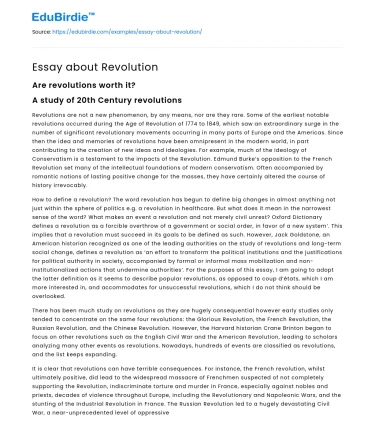Are revolutions worth it?
A study of 20th Century revolutions
Revolutions are not a new phenomenon, by any means, nor are they rare. Some of the earliest notable revolutions occurred during the Age of Revolution of 1774 to 1849, which saw an extraordinary surge in the number of significant revolutionary movements occurring in many parts of Europe and the Americas. Since then the idea and memories of revolutions have been omnipresent in the modern world, in part contributing to the creation of new ideas and ideologies. For example, much of the ideology of Conservatism is a testament to the impacts of the Revolution. Edmund Burke’s opposition to the French Revolution set many of the intellectual foundations of modern conservatism. Often accompanied by romantic notions of lasting positive change for the masses, they have certainly altered the course of history irrevocably.
How to define a revolution? The word revolution has begun to define big changes in almost anything not just within the sphere of politics e.g. a revolution in healthcare. But what does it mean in the narrowest sense of the word? What makes an event a revolution and not merely civil unrest? Oxford Dictionary defines a revolution as a forcible overthrow of a government or social order, in favor of a new system’. This implies that a revolution must succeed in its goals to be defined as such. However, Jack Goldstone, an American historian recognized as one of the leading authorities on the study of revolutions and long-term social change, defines a revolution as ‘an effort to transform the political institutions and the justifications for political authority in society, accompanied by formal or informal mass mobilization and non-institutionalized actions that undermine authorities’. For the purposes of this essay, I am going to adopt the latter definition as it seems to describe popular revolutions, as opposed to coup d’états, which I am more interested in, and accommodates for unsuccessful revolutions, which I do not think should be overlooked.
Save your time!
We can take care of your essay
- Proper editing and formatting
- Free revision, title page, and bibliography
- Flexible prices and money-back guarantee
There has been much study on revolutions as they are hugely consequential however early studies only tended to concentrate on the same four revolutions: the Glorious Revolution, the French Revolution, the Russian Revolution, and the Chinese Revolution. However, the Harvard historian Crane Brinton began to focus on other revolutions such as the English Civil War and the American Revolution, leading to scholars analyzing many other events as revolutions. Nowadays, hundreds of events are classified as revolutions, and the list keeps expanding.
It is clear that revolutions can have terrible consequences. For instance, the French revolution, whilst ultimately positive, did lead to the widespread massacre of Frenchmen suspected of not completely supporting the Revolution, indiscriminate torture and murder in France, especially against nobles and priests, decades of violence throughout Europe, including the Revolutionary and Napoleonic Wars, and the stunting of the Industrial Revolution in France. The Russian Revolution led to a hugely devastating Civil War, a near-unprecedented level of oppressive control, the potentially most destructive war the world would ever experience, the Cold War, and widespread poverty, famine, and starvation. Given the severity of the potential consequences of revolutions, it is important that we ask ourselves: is it worth it? Why disrupt the stability of a country, risk lives, and gamble with your freedom if your life won’t improve if you succeed? Different revolutions have different short-term goals, often institutions or governments they wish to overthrow, but long-term they all have the same goal. All participants of popular revolutions are ultimate, at a basic level, looking to improve their lives. Take the example of the French Revolution again, fundamentally, the revolution was driven by a desire for a better quality of life by the “Third Estate”, the commoners and bourgeoisie. The “Third Estate” could clearly see the dichotomy between the excesses and comfortable life enjoyed by the aristocracy and monarchy and their own lives, paying enormous taxes to pay off the old national debt and ubiquitous poverty. In the revolution, the monarch was abolished, and democracy was developed. Civic rights were implemented. It granted freedom of speech, worship, association, press, and ownership of land. However far too many revolutions end in bloodshed and an exchange of power from one elite to another. This was the case during the Romanian revolution of 1989. The dictator Ceausescu was overthrown by the masses, and over 1,000 Romanians died, but the military immediately filled the power chasm, not the democracy that the people had hoped for. Thus, we return to the aforementioned question: is it worth it?
In this essay, I will be using three case studies to explore this question: the 2003 Ukrainian Orange Revolution, the 2014 Hong Kong Umbrella Revolution, and the 2011 Libyan Revolution. Firstly, I think they are from across a diverse array of countries, hopefully negating certain factors that will affect the study. Secondly, they are recent so there are resources available, and easy to find on the Internet, and people who have witnessed them who I can contact. Furthermore, they are recently so relevant to modern life and make the project more useful in contemporary society. Understanding the net impact on quality of life could help people decide whether to have a revolution.
One of the biggest obstacles to my project will be measuring the quality of life. There are numerous indexes that measure the quality of life, but these are not across all countries across long time periods. In fact, there is no single index to compare all the revolutions with, but this is not so obstructive as I merely wish to measure the change in the quality of life across the revolutions themselves.






 Stuck on your essay?
Stuck on your essay?

